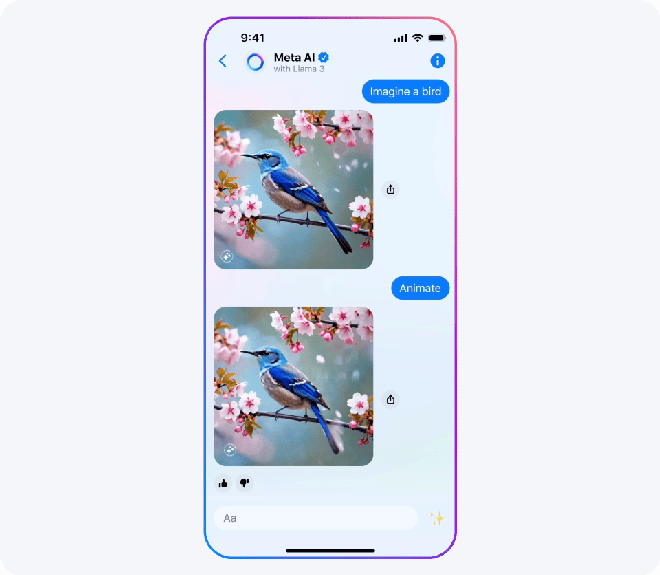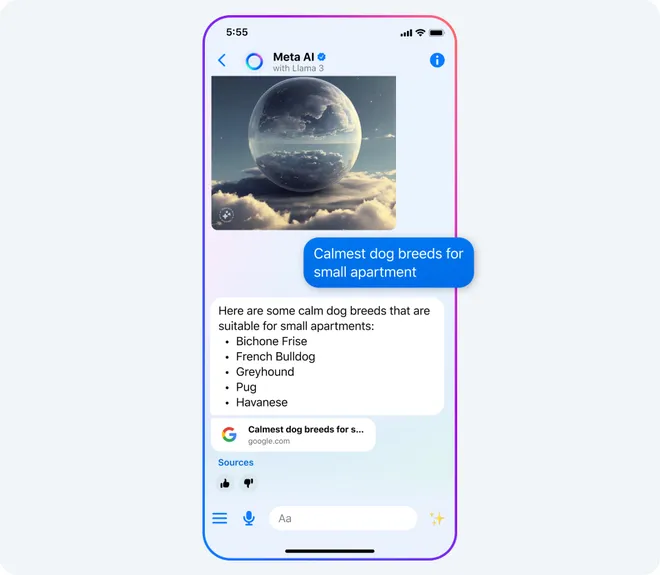What does Meta AI do? The latest upgrade creates images as you type and more.
All the big tech companies are trying to best each other with the ‘Hey, look what our artificial intelligence can do now’ updates, and on Thursday, Facebook parent company Meta rolled out its latest upgrade in a version called Llama 3.
Unlike previous Llama releases, Llama 3 has its dedicated website (meta.ai), where you can use the tool for free. It’s a riff on the ChatGPT formula – no charge, go and talk to it and see what it can do for you. The catch, of course, is that you log into it with a Facebook account.
“Big day here. We're releasing the new version of Meta AI, our assistant, that you can ask any question across our apps and our glasses,” Meta Platform CEO Mark Zuckerberg said in a statement sent to USA TODAY. “We built it into the search box right at the top of WhatsApp, Instagram, Facebook, and Messenger, so anytime you have a question, you can just ask it right there. We're also releasing a bunch of unique creation features. Meta AI now creates animations and creates high-quality images so fast that it generates and updates images for you in real-time as you're typing.”
Some of my friends already see the “Ask Meta AI anything prompt” at the top of their search feeds, but it hasn’t shown up in any of mine yet. Meta upgrades typically roll out in this way, though; some people get them right away, while others have to wait a bit.
Will it change your life in any way? Absolutely not. Do you care about it? Maybe. Let’s dive in.
What does Meta AI do?
The most interesting thing I’ve seen it do so far is to generate realistic-looking animated characters and images that update while you’re still typing in the prompts.

Just type what you want to see, and the image begins to generate as you type. Here’s an example: You want to see a curly-haired girl flying a dragonfly? Type “curly girl,” and it’s there. As you can see in the example above, the image continues to adapt to fit your narrative as you’re typing. The only limitation is your imagination. It’s like you can choose your own adventure but with no scary consequences.
What’s really cool about real-time image generation is that it doesn’t wait for the entire prompt to be written. Instead, it starts to “see” each object as you write about it and adjusts the final image in real time. This requires powerful hardware and software, which is fascinating to watch in action.
What could possibly go wrong?
It’s a great time waster and obviously a very powerful tool. We’ll have to see if Meta’s lewd content filters are up to snuff, however, as that’s a problem that plagued similar tools from Microsoft, Midjourney, and all the rest.
Regarding guardrails, most high-profile AI image generators from Microsoft and others have blacklisted keywords that allow them to generate images of famous people like movie stars and high-profile politicians. The data sets these models use typically don’t include “normal people,” so typing your friend’s name into the AI isn’t going to produce anything that looks like them.
There are always ways around these guardrails, though. Devoted users will likely figure out how to get certain celebrities to appear in images or even create NSFW (not safe for work) content using the system, which is something all the other AI image generators have been fighting against since day one.
Meta AI for searching and winning arguments with friends
What about generating fake images that people think are real, like of politicians during the upcoming elections? I’m going to get back to that in a second, but first, here are a few other things the company says the new Meta AI can do:
◾ Act as a personal assistant. “We believe Meta AI is now the most intelligent AI assistant you can use for free – and it’s available in more countries across our apps to help you plan dinner based on what’s in your fridge, study for your test, and so much more,” the company wrote in a statement. I see this as a way to win arguments with people on the apps and in real life.
◾ Enable more powerful search. You can now use Meta AI “in feed, chats, search and more across our apps to get things done and access real-time information, without leaving the app you’re using,” the company says.
◾ Create faster and more tailored images. "You can create album artwork for your band, decor inspiration for your apartment, animated custom GIFs, and more.”
During a video call demonstration earlier this week, a Facebook spokesperson said he expects people to use Meta AI “for fun and to be more social.”
To me, that means they’re trying to make Facebook more fun for more than just our parents and make Instagram more interesting so that young people don’t keep ditching it for TikTok. (Harsh, but kind of true, even though Facebook still has around three billion active users per month, which is about a third of the world’s population, according to digital marketing site Social Surge.)
Llama 3 will be available in 12 countries, including Canada, Australia, and South Africa, all of which are getting Meta’s AI for the first time.
Is Meta AI safe?
Llama 3 is the next generation of Meta’s open-source large language model. It’s similar to ChatGPT, which is about to unveil its upgraded model, GPT-5. Models like these power AI-based apps such as chatbots, image generators, and virtual assistants.
Upgrading from Llama 2 (launched in July 2023) to Llama 3 should mean more accurate responses, more human-like conversations, and a broader knowledge base for AI apps that use it. Meta wasn’t the first to debut an ultra-powerful artificial intelligence model – that honor, of course, went to OpenAI with ChatGPT – but it’s been working feverishly to catch up. Large language models like ChatGPT and Llama are incredibly versatile and can be used for many things. They are the brains behind AI chatbots, developer coding tools, automated writing assistants, and many other tools that are growing more ubiquitous by the day.
Building a large language model (LLM) of your own means being able to power the next generation of mega-powerful user-friendly apps, and that’s something that Meta is obviously interested in. It launched Llama 2 in July of last year and its successor is already here, which tells you everything you need to know about how many resources Meta is pouring into the project.
Llama 3’s power comes from the AI’s even larger foundation of data, which Meta has plenty of. The company tells me that Llama 3 draws from the vast pools of information generated by people who use the company’s products. However, it promises that personal and private information isn’t fed to its language models.
That’s a heartwarming promise, but can they ensure no sensitive information finds its way into one of these AI data sets? Not if history tells us anything, and that’s the cost of using social media.
Can a chatbot using Llama 3 technology be used for nefarious purposes? Can it pretend to be you or someone you know? Could it effectively “deep fake” your online identity, allowing a scammer to tarnish your name or worse?
Meta says that such a scenario isn’t possible thanks to various safeguards, but when we signed up for Facebook over a decade ago, we never could have guessed that one day, our content would feed AI. Wrestling with that reality might not sit well with many of Facebook’s longtime users.
Specifically, Meta says they won’t let any “public figure” get used in the image or video generation. If you type in someone’s name, it might generate what a computer thinks a person with that name might look like, but that would not necessarily be accurate.
It also has several NSFW safeguards built-in to protect against porn, racism, and other problems plaguing generative AI, but we have no idea how well those guardrails work.
Why is Meta investing so much in AI?

Meta is doing this because having a large language model like Llama 3 means you can add new features to your apps, like adding AI to the search features on Facebook and Instagram. It adds a layer of smarts and can reduce friction between users and the apps they like.
What's up with the Facebook app?:Why does the Facebook app look different? Meta rolling out new, fullscreen video player

By building its own high-powered AI, Meta can also sell licenses to companies that want to use it for their projects. ChatGPT runs on the same licensing business model, where access to AI is granted to companies and their users for a specific fee. Meta stands to make a lot of money with an LLM in various ways, including advertising (think auto-generated ads that appeal to you, specifically) and selling access to this AI.
Facebook has one of the largest stockpiles of any company's data, thanks to more than a decade of user-generated content in the form of posts, comments, replies, and so on. This data trains Llama in how humans talk and makes connections between words and objects, places, and concepts. The smarter it gets, the more helpful it should be.
That’s the theory, but I’ve been covering tech long enough to be skeptical at best.
Disclaimer: The copyright of this article belongs to the original author. Reposting this article is solely for the purpose of information dissemination and does not constitute any investment advice. If there is any infringement, please contact us immediately. We will make corrections or deletions as necessary. Thank you.







